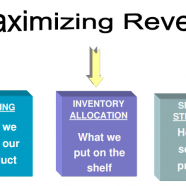Maximizing Revenue in Hospitality
Faced with increasing competition and more options for booking travel, how can hospitality CMOs deliver exceptional customer experiences while optimizing revenue?
The hospitality business, like many other industries, is being transformed by the digital revolution. Travelers who once called hotels directly or used travel agents to book rooms now have dozens of options, from hotel websites and central reservation centers to online travel agencies and discount brokerage services. Consumers’ use of online tools to research, reserve, and review accommodations is having a profound effect on the hotel industry, influencing pricing, customer loyalty, and ultimately profitability.
In this environment, CMOs are increasingly responsible for delivering exceptional experiences while maximizing revenue. “Successful CMOs are getting more sophisticated about how they target potential guests, offer products and services to brand loyalists, and attract brand-agnostic customers to their properties,” says Siva Kantamneni, principal at Deloitte Consulting LLP.
In trying to achieve these objectives, hospitality CMOs may face the following challenges:
Pricing complexity. Increased transparency in hotel pricing—with many online travel services showing price comparisons and room availability in near real time—is adding complexity to the already difficult job of pricing hotel rooms competitively. “How can companies optimize profits while attracting travelers and standing out from the herd?” asks Vivek Bhogaraju, director of global strategic alliances and initiatives at IDeaS Revenue Solutions, a SAS company. Another factor to consider in pricing is the traveler’s persona. “A guest may want completely different experiences and have different price sensitivity as a corporate vs. weekend traveler,” he says.
Eroding brand loyalty. The competitive landscape is heating up, with major hotel chains adding more brands and new players like Airbnb entering the fray. The world’s 10 largest hotel chains now offer a combined 113 brands—31 of which didn’t exist a decade ago— at various price points. This proliferation is contributing to diminished brand loyalty among travelers. “Online travel agencies and credit card companies offer their own rewards programs, eroding the brand-building efforts of hotel companies. Add to this brand blur the influence of millennial consumers, who want immediacy and satisfaction, and the whole notion of brand loyalty gets turned on its head,” says Amitava Chatterjee, managing director of travel, hospitality, and leisure at Deloitte Digital.
Disparate systems. At many hotels, customer data resides in different systems. Reservation information may be kept in one system, hotel stay data in another, food and beverage transaction data in a third, and accounting information in yet another. “In the hospitality industry, as in many others, the different systems don’t always communicate all the transactional data,” says Bhogaraju. For example, a guest may order a bottle of Merlot at the hotel restaurant, and while the specific brand might be included in the restaurant’s point-of-sale system, it may be omitted when the data is transferred to the hotel’s centralized guest history system. “Without better systems integration, companies may be missing opportunities to mine customer data for insights they can use to target guests with customized offers,” Bhogaraju says
Competing investment priorities. With different stakeholders to satisfy, including customers, employees, and investors, hospitality executives often face difficult decisions regarding where to invest, whether that’s upgrading technology or renovating guest rooms. “If a hotel is owned by a real estate investment trust that just sees the property as a cash cow, it may be difficult to justify investing in new technology if the walls need painting,” Chatterjee says. “Often, hospitality companies don’t look at technology, data, or analytics investments as foundational—although such investments can drive growth and help companies compete more effectively.”
How to Deliver Customer Value and Drive Revenue
To meet these challenges and help their companies maximize profits by delivering valuable customer experiences, hospitality CMOs can consider the following tactics:
Automate data gathering and leverage analytics. By automating data collection and using analytics to track customer preferences, hospitality companies can help improve staff interactions with guests at every touchpoint. For example, a room service employee might recommend Thai soup to a guest during the order-taking process, based on previous transaction history. Companies might consider designing systems that provide alerts or pop-up screens to employees during interactions with guests, with specific recommendations to help add value.
Use data-driven insights for pricing. In addition to analyzing individual customer data to drive revenue, hospitality companies can leverage insights from predictive demand data to develop pricing strategies. For example, some hospitality companies might offer different price points or packaged offers to travelers based on their geographic location or travel purpose.
Offer incentives to loyalty members. To increase brand loyalty and drive customers to the property’s own channels rather than third-party travel sites, hotels can offer value-added services to loyalty members. For example, a hotel might offer an additional amenity—a room upgrade, for instance—to loyalty members who book through the hotel directly,
Elevate the role of IT. CMOs can help facilitate discussions in their organizations about the role of technology in delivering added value. “In the hospitality industry, technology investments are often not given top priority,” Chatterjee says. “However, technology is just as important as pillowcases or towels. Without IT, there is no hospitality.”
*****
To help differentiate their brands in an increasingly crowded field, hospitality CMOs can leverage data, analytics, and technology to improve interactions with guests. Armed with deep insights about their customers, hospitality companies can deliver personalized experiences that can aid in building brand loyalty and improving profitability.






